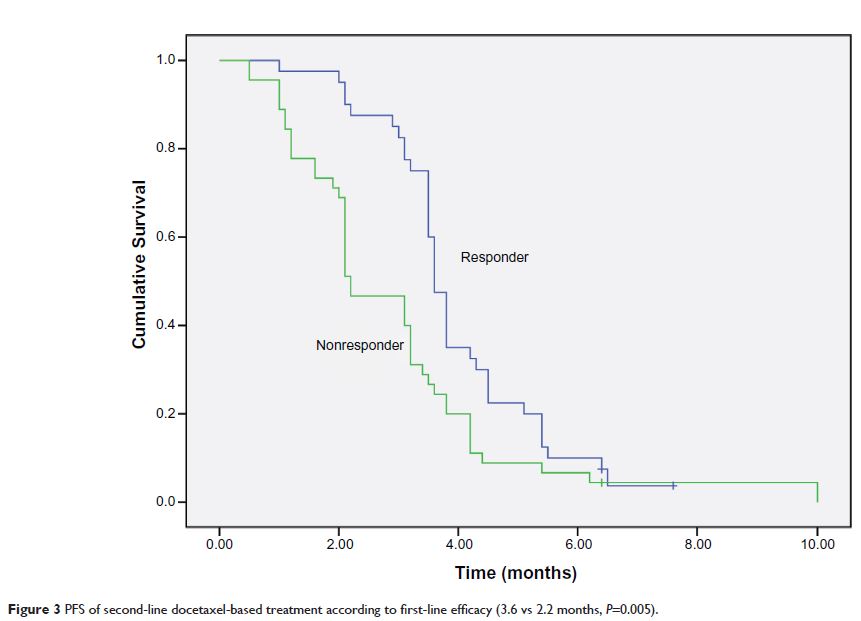109229
论文已发表
注册即可获取德孚的最新动态
IF 收录期刊
- 3.4 Breast Cancer (Dove Med Press)
- 3.2 Clin Epidemiol
- 2.6 Cancer Manag Res
- 2.9 Infect Drug Resist
- 3.7 Clin Interv Aging
- 5.1 Drug Des Dev Ther
- 3.1 Int J Chronic Obstr
- 6.6 Int J Nanomed
- 2.6 Int J Women's Health
- 2.9 Neuropsych Dis Treat
- 2.8 OncoTargets Ther
- 2.0 Patient Prefer Adher
- 2.2 Ther Clin Risk Manag
- 2.5 J Pain Res
- 3.0 Diabet Metab Synd Ob
- 3.2 Psychol Res Behav Ma
- 3.4 Nat Sci Sleep
- 1.8 Pharmgenomics Pers Med
- 2.0 Risk Manag Healthc Policy
- 4.1 J Inflamm Res
- 2.0 Int J Gen Med
- 3.4 J Hepatocell Carcinoma
- 3.0 J Asthma Allergy
- 2.2 Clin Cosmet Investig Dermatol
- 2.4 J Multidiscip Healthc

已发表论文
对晚期食管鳞状细胞癌进行氟尿嘧啶为基础的一线治疗失败后,使用多西他赛为基础二线化疗
Authors Song ZB, Zhang YP
Published Date October 2014 Volume 2014:7 Pages 1875—1881
DOI http://dx.doi.org/10.2147/OTT.S66525
Received 19 April 2014, Accepted 9 July 2014, Published 13 October 2014
Purpose: This retrospective analysis evaluates the clinical efficacy and toxicity of second-line docetaxel-based chemotherapy after failure of fluorouracil-based first-line treatment for advanced esophageal squamous cell carcinoma (ESCC).
Methods: We retrospectively reviewed patients who had received second-line docetaxel-based chemotherapy for advanced ESCC in Zhejiang Cancer Hospital between January 2008 and December 2011. Survival curves were plotted using the Kaplan–Meier method. The Cox proportional hazard model was used for multivariate analysis.
Results: Eighty-five patients received docetaxel-based second-line chemotherapy after the failure of first-line fluorouracil-based treatment. Forty-four patients received docetaxel-platinum chemotherapy, and 41 received docetaxel single-agent treatment. The progression-free survival (PFS) and overall survival (OS) were 3.5 and 5.5 months in all of the patients, respectively. There were no statistically significant differences in PFS and OS between docetaxel-platinum and docetaxel single-agent chemotherapy groups (P -value 0.38 and 0.64, respectively). Response to first-line chemotherapy was a favorable prognostic factor for PFS in uni- and multivariate analyses (P -value 0.005 and 0.028, respectively).
Conclusion: Patients with docetaxel-based second-line treatment obtained a moderate PFS advantage in advanced ESCC. Response to first-line chemotherapy was a favorable prognostic factor for PFS of second-line chemotherapy in advanced ESCC.
Keywords: ESCC, efficacy, toxicity
Methods: We retrospectively reviewed patients who had received second-line docetaxel-based chemotherapy for advanced ESCC in Zhejiang Cancer Hospital between January 2008 and December 2011. Survival curves were plotted using the Kaplan–Meier method. The Cox proportional hazard model was used for multivariate analysis.
Results: Eighty-five patients received docetaxel-based second-line chemotherapy after the failure of first-line fluorouracil-based treatment. Forty-four patients received docetaxel-platinum chemotherapy, and 41 received docetaxel single-agent treatment. The progression-free survival (PFS) and overall survival (OS) were 3.5 and 5.5 months in all of the patients, respectively. There were no statistically significant differences in PFS and OS between docetaxel-platinum and docetaxel single-agent chemotherapy groups (P -value 0.38 and 0.64, respectively). Response to first-line chemotherapy was a favorable prognostic factor for PFS in uni- and multivariate analyses (P -value 0.005 and 0.028, respectively).
Conclusion: Patients with docetaxel-based second-line treatment obtained a moderate PFS advantage in advanced ESCC. Response to first-line chemotherapy was a favorable prognostic factor for PFS of second-line chemotherapy in advanced ESCC.
Keywords: ESCC, efficacy, toxicity
